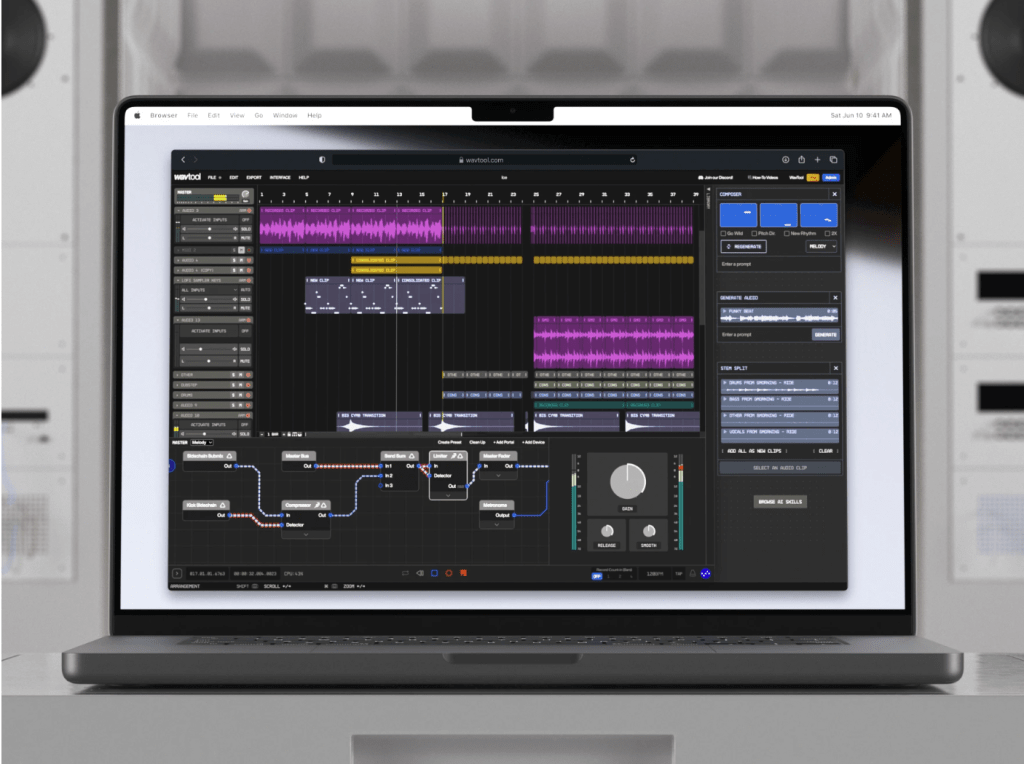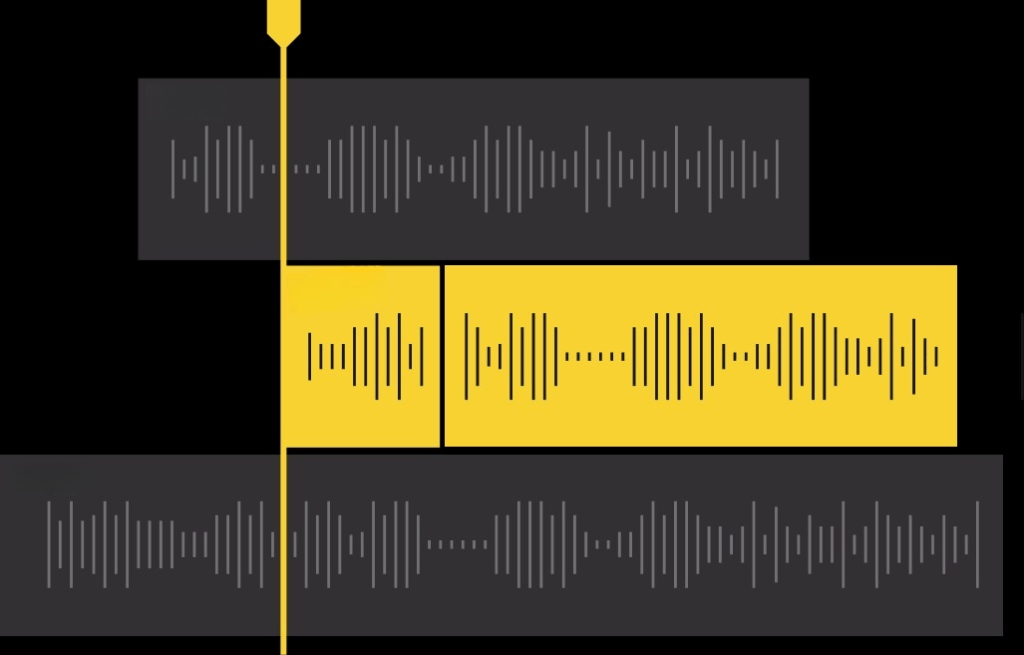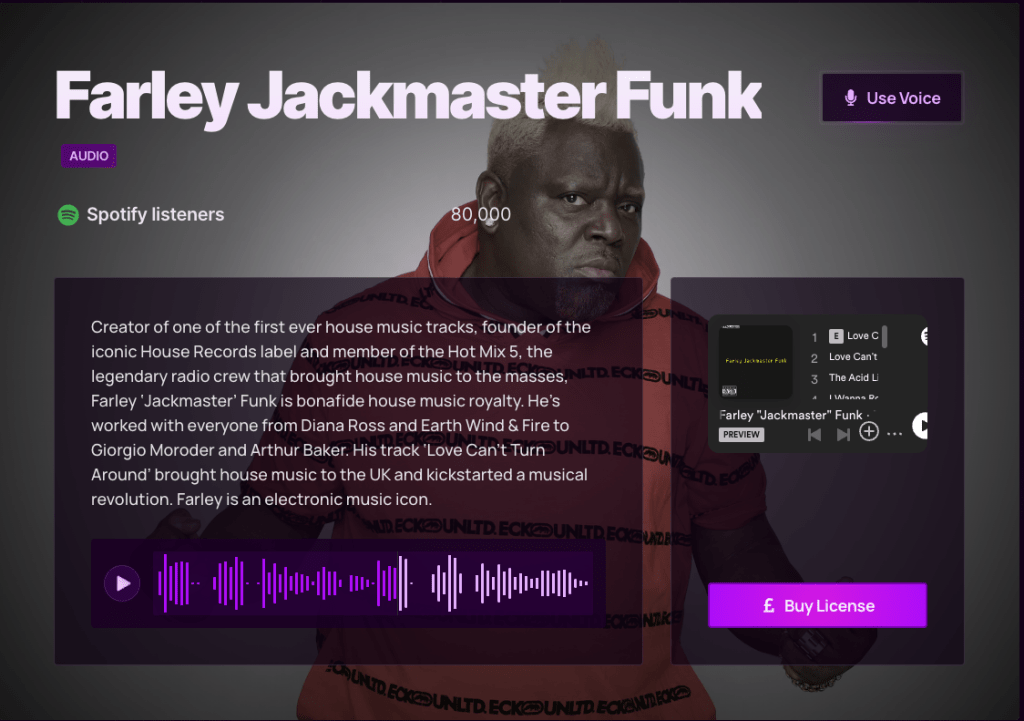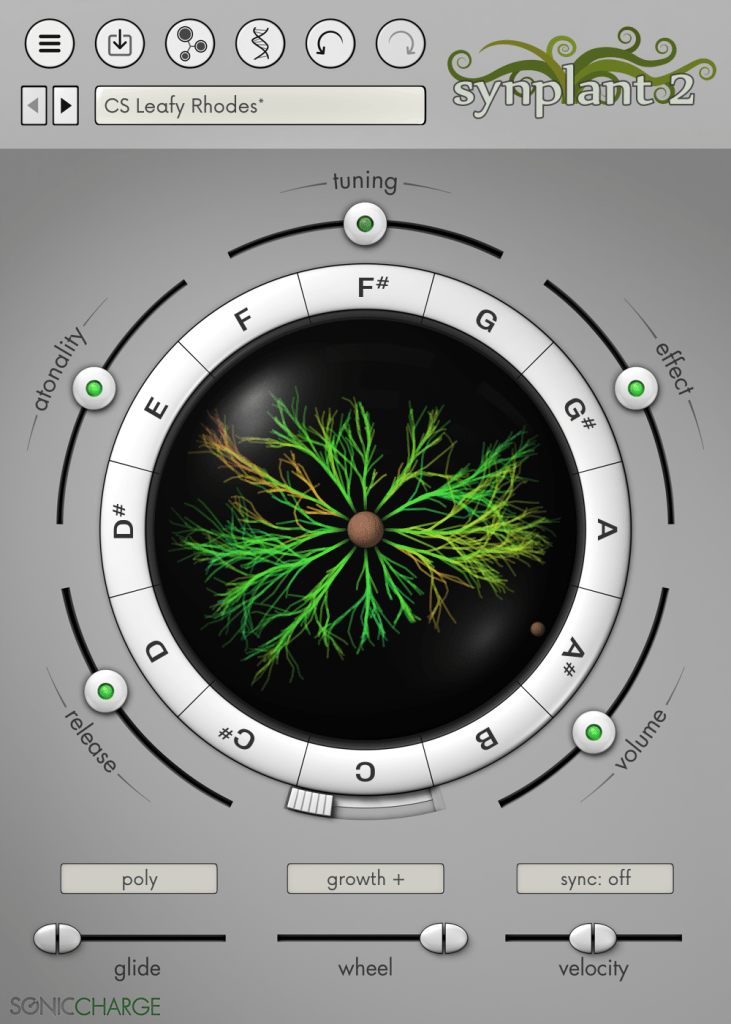Creativity & AI
music in the age of AI
Creativity and AI is an important subject for our age. Artificial Intelligence is already everywhere, and increasingly this includes the creative industries. However I think it’s first worth asking just what AI is in relation to creativity. Is it truly creative?
In my experience, true creativity comes from somewhere beyond the thinking mind, in the moment and without conscious involvement. AI, by its very nature, is actually the opposite of this. It is a simulacrum of the intellectual mind alone; a compiler of data and an organiser of facts. It certainly has a creative aspect, in its ability to create new forms from existing input, but it is always operating from within a fixed field of reference.
As for music production, so much of the current focus within the ‘consumer’ arena is exactly that – aimed at the creation of material for consumption. A major focus of new software is to make music ‘faster’ and ‘easier’, and this is of course where AI promises so much. AI excels at combining pre-existing forms and creating clever cross-pollinations and mixtures of what it has found. However it has no awareness of what is ‘good art’ or ‘bad art’, and has no taste other than what it has been informed of.
By its nature AI will produce things that are an amalgam of what it has fed on. Some of those things will indeed be novel, but it is still a closed system, and we are not. We, as individuals, are capable of true creative thought and have access to emotions, imagination and transcendence. And are we making music simply as product? And is it not also a question of satisfaction in the creation process?

the future of AI
This is a fast moving world and, even this month, huge steps have been revealed to the public in the form of OpenAI’s Sora text-to-video generator. Some results already look shockingly like a well-made arthouse film. It is only a matter of time before similar efforts are directed at the creation of sound. At present, it is fair to say that AI music has little emotional resonance.
In time, AI will get better at garnering an emotional response in the music it creates, but even then it will be from a place of no understanding, no correspondence, no empathy. It will be interesting to see how this takes shape, and what differences can be observed between the creations of AI and those of the higher practitioners of their art. As AI becomes more integrated with our emotional lives through the feedback systems in AR headsets, and other such horrors, it will no doubt learn what art elicits an emotional response and feed us on the cultural pap that our society has trained us to enjoy. It cannot produce art of a new epoch, only regurgitate the past, and has no higher ideal to strive for, only a closed feedback system to work within.
However, in arenas where originality is not the primary concern such as music for film and TV, it is clear that AI will take the majority of work. There will certainly be times when a real composer is wanted to create something with the hallmarks of human ingenuity and emotional resonance, but in the vast majority of cases AI will suffice. Movies themselves will no doubt become increasingly AI generated, and the whole industry will shift unless an active moratorium on the use of AI comes into effect. Which is almost entirely unlikely in the current climate.
I’d be interested to know, from people who understand AI at a deeper level, how they believe this negative appraisal might be wrong, and if they believe AI can indeed create the true art of the future. I believe that this hypothesis would have to start from the assumption that consciousness is produced by the brain, and can therefore be replicated by AI. There is currently a lot of thought and research going into understanding how our minds and consciousness actually interact, and art is at the very centre of this question. I highly recommend Iain McGilchrist’s work in this respect.
There is no question that these tools are going to become incredibly powerful and have a far-reaching effect on the music industry, and indeed every industry. This is especially true in the world of mainstream pop and EDM, where the music is already so formulaic that it takes little imagination to realise that AI could easily take over before long. Whether this leads to a reaction and resurgence in more ‘human’ music and greater focus on writing skill remains to be seen.
AI Tools for Musicians
Corporate Audio
Most of the AI tools I have seen so far are aimed at people who work in other fields and need generic music to fill a gap or accompany a video. This makes complete logical sense, as the necessity of originality or new forms of creation are not the first priority in these spheres. But for the library music creators and other musicians whose music was used to train the AI models, this is still a big negative. As in many other lines of work, AI is scooping up a big chunk of potential work for creative people. One might argue, with some justification, that at least human beings aren’t being reduced to churning out middle-of-the-road dirge to fulfil the needs of the advertising industry, but there is always the question of making a living.
One (randomly selected) example in this category is AIVA, which basically auto-composes music based on the previously analysed work of others. It is the audio equivalent of Midjourney in that respect. Where it differs is that it also allows you to edit the results in a DAW interface, although without the features of a pro DAW. The demo video makes clear the kind of arena it is aimed at, featuring a generic style that sounds like an autogenerated Youtube video called “the most luxurious mansions in the world.…ever!”
AI Idea Generation
There is also the possibility of using ChatGPT like a sort of modern Oblique Strategies or personal assistant, asking it for new creative directions or suggestions, perhaps in the style of Brian Eno or Aphex Twin. Using AI like this gives more room for creative interaction and personality, and points to a more collaborative role that actually serves creation. Anything which prompts our own mind into doing some work for itself can probably be considered less harmful in the long run.
AI DAWs
An example which incorporates this idea, and pushes it into the realm of ‘AI assisted creation’ is Wavtool, one of the new raft of AI DAWs, which assist in creating ideas as starting points or provide new options from existing material. There is no question that this looks like smart software, and represents some of the paths of the future, being both browser-based and AI-heavy. For a more complete list of these kind of auto-creation tools, Mixmag have already covered the bases in more detail.
Personally I would avoid anything that takes away one’s own potential for creation, but I recognise that for many people these things might be a godsend in getting music made and projects finished, and providing creative satisfaction. I would always advise trying to do it yourself first. It really isn’t hard to extrapolate new material from existing ideas, so I would advise practicing those skills and developing that way of working, as it will gradually help to form an identity that is wholly your own.
In terms of music, things take time, and good things sometimes take lots of time (““Genius is the infinite capacity for taking pains.”). And things which are ‘easy’ rarely stand the test of time. That’s not to say that good things don’t sometimes happen easily, but usually there is a huge amount of work that has gone on up until that point to make such ease possible. Picasso could draw a dove on a napkin with five strokes of a ballpoint and have it worth thousands, but he’d paid his dues in blood and sweat and time.

Practical and Repetitive Tasks
Where AI can be especially useful is in dull repetitive tasks, such as editing, noise removal, reverb removal and other such functional processes. It is also incredible at processes that have been honed from analysing other music through machine learning. Some of this can be like magic, particularly when it comes to cleaning noisy files or applying EQ in smart ways. It’s not always clear what processes are going on behind the scenes, and there is certainly a fair bit of confusion over what exactly entails ‘AI’. And of course many manufacturers are happy to play on this confusion and say that their new plugin ‘uses AI’ when that could just be referring to the style of the buttons, or using Chat GPT in the writing of the press release.
Recently I had the job of removing spill from a live drum recording. My first port of call was the processing I would normally use on drum multitracks, such as intelligent gates (which use spectral information to hone into particular parts of the drum kit) and general noise removal. This took a lot of work, and resulted in something that still contained a fair amount of bleed so as not to lose too much of the essence of the drums. For comparison, I passed the whole mixed file through one of the AI processors (in this case Lalala.ai) that can intelligently remove elements of a recording, choosing the ‘Drums’ setting. The result was pretty incredible, with only a minimum of background audio apparent when it was beneath another sound. That’s not to say there isn’t a place for professional mixers to do that work (the cymbals in particular sometimes showed signs of being shortened) but for the majority of people, AI now owns that job.

- Noise Removal
This is the boss, in my opinion. Removing background noise, clanking, drills, singing etc etc etc could be a huge pain and take forever. The new AI tools really do deliver on the hype in this arena, removing unwanted artefacts of any kind. This can also include room sound, which used to be the preserve of the most expensive studio tools in the business, and I have had great results from free services such as Veed.io to do this. Other honourable mentions here go to:
Lalal.ai This does a whole range of things, such as splitting a song into component parts, removing noise, and even AI voice modelling. They are also creating a VST version which promises great utility.
Adobe Podcast AI. A one-stop shop for achieving an instant high quality vocal sound. It removes room sound, adds compression and EQ, and generally sounds outstanding.
- Smart EQSs: Sonible Smart EQ, Gullfoss, TEOTE.
There are an increasing range of smart EQs now available, and they will only get smarter. Gullfoss can already achieve remarkable things that would previously have been possible only by mixing engineers with golden ears. Sonible Smart EQ4 also features a load of auto-adjusting features that use machine learning models to hone multitracks and mixes. All of these processes also work on continuously listening basis, changing their settings constantly in relation to the incoming material, which is a huge advance over a fixed setting applied by an engineer, even if they also used some automation. It is not hard to imagine that EQs trained on professional multitracks will gradually eclipse all but the best mix engineers, and bring professional sound to the masses.

-
Auto Mixing & Mastering
One step up from the EQs in terms of complexity are the new processors that handle a full range of tasks on any particular source material. Izotope have incorporated AI into a number of their plugins, and probably lead the field in plugins that actually use machine learning models to achieve their results; Neutron, Nectar, Ozone and the new VEA vocal plugin all use AI models to work their magic. There are also a number of auto-mastering services, such as LANDR, which use AI to create a finished master in line with industry standards. Again, I believe this is done with large scale machine learning models which analyse a huge array of other mastered songs and then apply those learnt characteristics to your own muddy mixes. The results are not as impressive as a true mastering engineer, particularly when you want to master for vinyl or for a particular use-case, but the results are nonetheless highly usable for most people.
- SEO and career support
The other major use-case for musicians is undoubtedly the use of AI analysis for promotion, marketing and all of that stuff that so many of us are not great at. Doing the SEO (search engine optimisation) for your website or telling you what hashtags are popular for music social media posts are two immediately helpful possibilities of AI. There are also some more insidious possibilities such as analysing what songs are popular with what demographics, and further encouraging producers to plough those same musical furrows to maximise their audience. But that it is nothing new, just a massive increase in the efficiency of the process (I remember reading an interview in Sound On Sound with one of the big trance guys, who said that the first thing him and his producer did in the studio was to call up the current top 10 in Spotify and try to analyse what was on trend).
SEO by its nature is a bit of a ghoul, sacrificing humanity at the altar of computer readability and focussing on prompting fear, lust or lack in the mind of those reading in order to secure more clicks. This is from ‘viral marketer’ and author Jonah Berger :
“Anger and anxiety lead people to share because, like awe, they are high-arousal emotions. They kindle the fire, activate people, and drive them to take action.”
Jonah Berger – “Contagious”
But these are the waters we swim in, and if used judiciously these tools can be effective and helpful without turning us into merely marketeers.
A further practical benefit for musicians is all the dry technical stuff to do with legalities, contracts and copyright. Which is ironic really, since there is currently a war on over how musical copyright can work in the age of AI. But still, there is no doubt that AI can help collect data on plays, and assign publishing on a much greater scale than previously possible, meaning that more artists should in theory be paid. AI is also good at deciphering legal jargon, and making contracts more understandable to us poor dolts who don’t know what we’re signing. You can probably get ChatGPT to explain copyright and royalties to you as well, which i should probably do myself actually.
Further Use Cases
-
AI guest vocalists.
Very cool. Already becoming the future of mainstream music as ‘fake Drake’ can now churn out hits and tour as a hologram, with little trouble to the actual fleshy Drake who can now spend more time shopping online. For our purposes we can now commit sacrilege and have Nina Simone as guest vocalist singing ‘Barbie Girl’. Major labels have already apparently licensed the voices of their most famous artists, with the artists themselves receiving a cut of profits. Presumably there will also have to be some commercial to-and-fro to ensure that only approved music can use the licensed voice.
A new service Voiceswap also offers a range of famous singers as guest vocalists, and the results sound impressive, and offer a useful income stream for singers who are no doubt not as busy as they used to be.
Grimes wins the prize for most committed by releasing Elftech, which allows users to utilise her own voice model in their music.

- Sonic Charge’s Synplant 2 synth is a truly new proposition in the world of AI and music, and represents something genuinely useful. AI is used to match the sound of the synth to an imported audio file, and to create a range of variations based on that input. It is never going to be 100% accurate at reproducing the input sound (despite often getting very close) but it can create a vast range of new timbres and unusual patches that can inspire creativity. This is perhaps the most creative use of AI in music I have seen so far.

-
Acapella Creation & Stem Separation
This is another one that I wished I had years ago. Creating acapellas of tracks that you want to remix is a great AI capability and as a teaching aid this can also be valuable, dissecting a student’s favourite track to show what has gone into it. The results of services such as Lalal.ai are not perfect but they are a whole lot better than previous capabilities. Of course there are still copyright issues here, but for the creation for music for playing out and for personal use this is a great tool.



